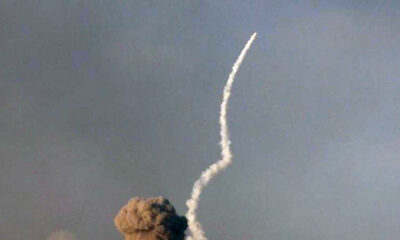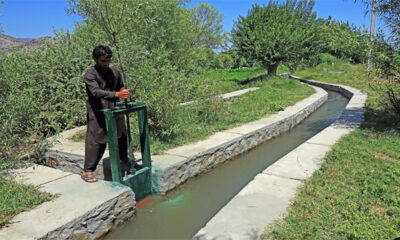World
France’s Macron defeats far-right, pledges change

Emmanuel Macron comfortably defeated far-right rival Marine Le Pen on Sunday, heading off a political earthquake for Europe but acknowledging dissatisfaction with his first term and saying he would seek to make amends.
His supporters erupted with joy as the results appeared on a giant screen at the Champ de Mars park by the Eiffel tower.
Leaders in Berlin, Brussels, London and beyond welcomed his defeat of the nationalist, eurosceptic Le Pen.
With 97% of votes counted, Macron was on course for a solid 57.4% of the vote, interior ministry figures showed. But in his victory speech he acknowledged that many had only voted for him only to keep Le Pen out and he promised to address the sense of many French that their living standards are slipping.
“Many in this country voted for me not because they support my ideas but to keep out those of the far-right. I want to thank them and know I owe them a debt in the years to come,” he said.
“No one in France will be left by the wayside,” he said in a message that had already been spread by senior ministers doing the rounds on French TV stations.
Two years of disruption from the pandemic and surging energy prices exacerbated by the Ukraine war catapulted economic issues to the fore of the campaign. The rising cost of living has become an increasing strain for the poorest in the country.
“He needs to be closer to the people and to listen to them,” digital sales worker Virginie, 51, said at the Macron rally, adding he needed to overcome a reputation for arrogance and soften a leadership style Macron himself called “Jupiterian”.
Le Pen, who at one stage of the campaign had trailed Macron by just a few points in opinion polls, quickly admitted defeat. But she vowed to keep up the fight with parliamentary elections in June.
“I will never abandon the French,” she told supporters chanting “Marine! Marine!”
Macron can expect little or no grace period in a country whose stark political divisions have been brought into the open by an election in which radical parties scored well. Many expect the street protests that marred part of his first term to erupt again as he presses on with pro-business reforms.
“There will be continuity in government policy because the president has been reelected,” Health Minister Olivier Veran said. “But we have also heard the French people’s message.”
How Macron now fares will depend on the looming parliamentary elections. Le Pen wants a nationalist alliance in a move that raises the prospect of her working with rival far-rightists like Eric Zemmour and her niece, Marion Marechal.
Hard-left Jean-Luc Melenchon, who emerged as by far the strongest force on the left of French politics, said he deserves to be prime minister – something that would force Macron into an awkward and stalemate-prone “cohabitation”.
“Melenchon as prime minister. That would be fun. Macron would be upset, but that’s the point,” said Philippe Lagrue, 63, technical director at a Paris theatre, who voted for Macron in the run-off after backing Melenchon in the first round.
Outside France, Macron’s victory was hailed as a reprieve for mainstream politics rocked in recent years by Britain’s exit from the European Union, the 2016 election of Donald Trump and the rise of a new generation of nationalist leaders.
“Bravo Emmanuel,” European Council President Charles Michel, wrote on Twitter. “In this turbulent period, we need a solid Europe and a France totally committed to a more sovereign and more strategic European Union.”
“Congratulations to the President and a true friend @EmmanuelMacron on the election victory,” Ukraine President Volodymyr Zelenskiy wrote on his Twitter account in early hours on Monday.
“The financial markets will breathe a collective sigh of relief following Macron’s election victory,” said Seema Shah, Chief Strategist at Principal Global Investors.
The disillusion with Macron was reflected in an abstention rate expected to settle around 28%, the highest since 1969.
Initial polling showed the vote was sharply split both by age and socio-economic status: Two-thirds of working class voters backed le Pen, while similar proportions of white-collar executives and pensioners backed Macron, an Elabe poll showed.
Macron won around 59% of votes by 18-24 year-olds with the vote almost evenly split in other age categories.
During the campaign, Le Pen homed in on the rising cost of living and Macron’s sometimes abrasive style as some of his weakest points.
She promised sharp cuts to fuel tax, zero-percent sales tax on essential items from pasta to diapers, income exemptions for young workers and a “French first” stance on jobs and welfare.
“I’m shocked to see that a majority of French people want to reelect a president that looked down on them for five years,” Adrien Caligiuri, a 27-year-old project manager said at the Le Pen rally.
Macron meanwhile pointed to Le Pen’s past admiration for Russia’s Vladimir Putin as showing she could not be trusted on the world stage, while insisting she still harboured plans to pull France out of the European Union – something she denies.
World
UN Security Council to vote Friday on Palestinian UN membership
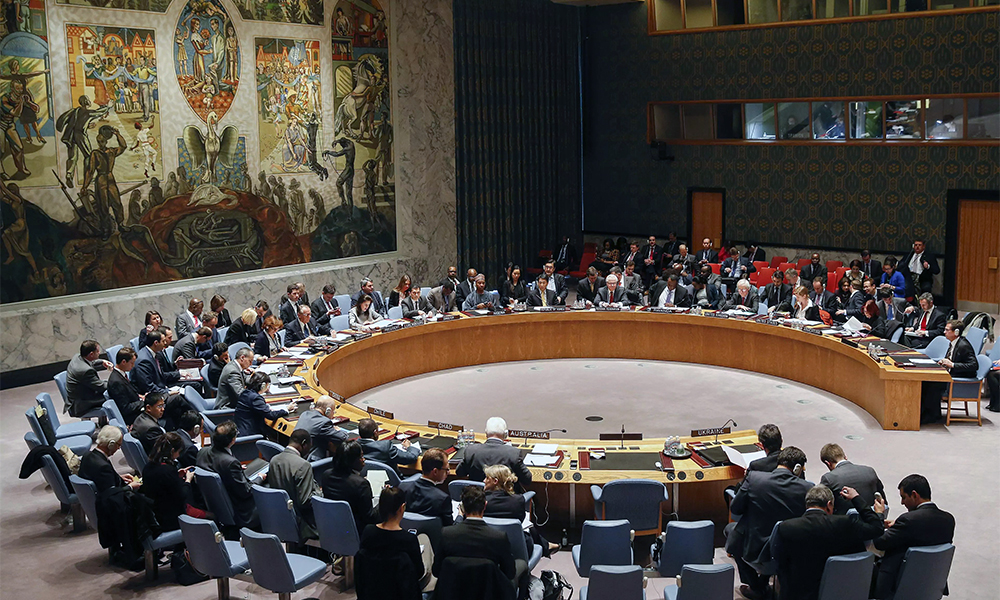
The United Nations Security Council is scheduled to vote Friday on a Palestinian request for full U.N. membership, said diplomats, a move that Israel ally the United States is expected to block because it would effectively recognize a Palestinian state.
The 15-member council is due to vote at 3 pm Friday on a draft resolution that recommends to the 193-member U.N. General Assembly that “the State of Palestine be admitted to membership of the United Nations,” diplomats told Reuters.
A council resolution needs at least nine votes in favor and no vetoes by the U.S., Britain, France, Russia or China to pass. Diplomats say the measure could have the support of up to 13 council members, which would force the U.S. to use its veto.
Council member Algeria, which put forward the draft resolution, had requested a vote for Thursday afternoon to coincide with a Security Council meeting on the Middle East, which is due to be attended by several ministers.
The United States has said that establishing an independent Palestinian state should happen through direct negotiations between the parties and not at the United Nations.
“We do not see that doing a resolution in the Security Council will necessarily get us to a place where we can find … a two-state solution moving forward,” U.S. Ambassador to the U.N. Linda Thomas-Greenfield said on Wednesday.
The Palestinians are currently a non-member observer state, a de facto recognition of statehood that was granted by the 193-member U.N. General Assembly in 2012. But an application to become a full U.N. member needs to be approved by the Security Council and then at least two-thirds of the General Assembly.
The U.N. Security Council has long endorsed a vision of two states living side by side within secure and recognized borders. Palestinians want a state in the West Bank, east Jerusalem and Gaza Strip, all territory captured by Israel in 1967.
Little progress has been made on achieving Palestinian statehood since the signing of the Oslo Accords between Israel and the Palestinian Authority in the early 1990s.
World
EU leaders back new Iran sanctions after attack on Israel

European Union leaders decided on Wednesday to step up sanctions against Iran after Tehran’s missile and drone attack on Israel left world powers scrambling to prevent a wider conflict in the Middle East, Reuters reported.
The summit in Brussels is the first meeting of the EU’s 27 national leaders since Saturday’s attack, more than six months into the war between Israel and the Iran-backed Palestinian militant group Hamas.
Israel has signalled it will retaliate but has not said how. EU leaders condemned the Iranian attack, reaffirmed their commitment to Israel’s security and called on all sides to prevent more tensions, including in Lebanon.
“We feel it’s very important to do everything to isolate Iran,” said summit chairman Charles Michel, adding the new sanctions against the Islamic Republic would target companies involved in the production of drones and missiles.
German Chancellor Olaf Scholz said it was important that Israel “does not respond with a massive attack of its own.”
Italy spoke separately ahead of G7 talks in favour of sanctions against arms suppliers linked to the attack against Israel, as well as those behind attacks on ships in the Red Sea, read the report.
Iran launched its assault in response to an April 1 strike on its embassy in Damascus which it blamed on Israel. Tel Aviv started its broader military offensive in Gaza after Hamas’ deadly attack on Israel on Oct. 7.
ISRAEL AND UKRAINE
EU foreign ministers are due to continue the sanctions work on Monday as the United States and its Western allies hope new steps against Iran will help limit any Israeli retaliation.
The EU already has multiple programmes that target Iran for human rights abuses, the proliferation of weapons of mass destruction, and Tehran’s support for Russia’s war in Ukraine, Reuters reported.
Germany, France and several EU states are looking at expanding a scheme that seeks to curb the supply of Iranian drones to Russia to include the provision of missiles and cover deliveries to Iranian proxies in the Middle East.
Belgium backed introducing sanctions against Iran’s Revolutionary Guard Corps but Scholz said that required further legal checks. The bloc’s top diplomat has said that could only happen if a national authority in the EU found that the group had been involved in terrorist activity.
Analysts say Iran is unlikely to face more severe economic punishment because of worries about boosting oil prices and angering top buyer China.
With the Middle East capturing much of the EU’s attention, Ukraine’s President Volodymyr Zelenskiy appealed for more help in holding the line against Russia, which unleashed an invasion against its neighbour more than two years ago, read the report.
“Here in Ukraine, in our part of Europe, unfortunately, we do not have the level of defence that we all saw in the Middle East a few days ago,” Zelenskiy told the summit, after Israel and allies mostly shot down the incoming drones and missiles.
“It reflects our current key need – the need for air defence,” he said, according to an EU official, repeating his calls for speedier deliveries of the weapons and ammunition previously promised to Ukraine.
World
US and allies plan more Iran sanctions; Israel war cabinet to meet again
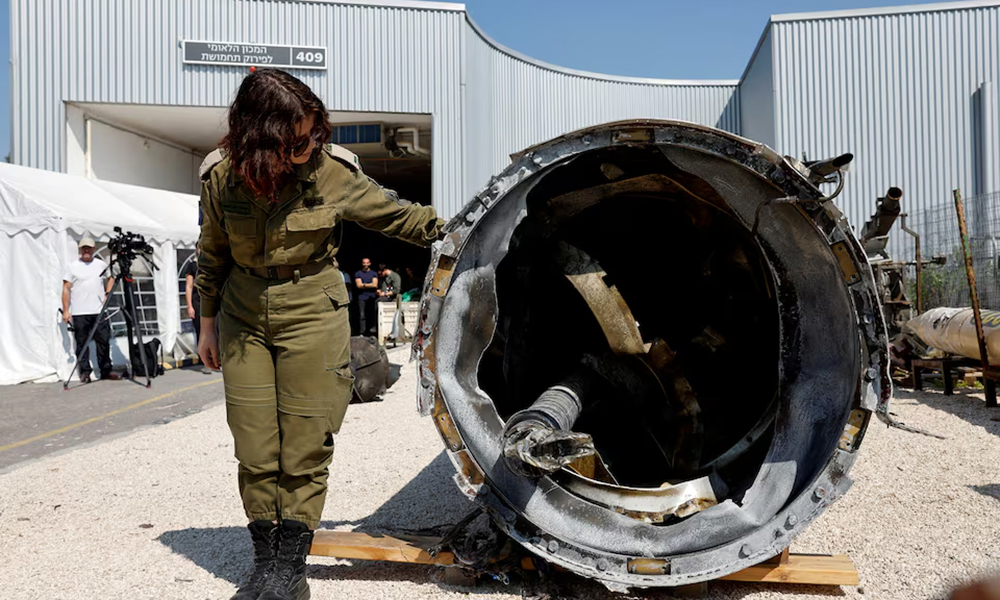
The U.S. and its allies planned fresh sanctions against Iran over its unprecedented attack on Israel, seeking to dissuade Israel from a major escalation as its war cabinet was set to meet for a third time on Wednesday to decide a response, Reuters reported.
While Saturday night’s attack caused no deaths and little damage thanks to the air defences and countermeasures of Israel and its allies, it has increased fears that violence rooted in the six-month-old Gaza war is spreading, with the risk of open war between long-time adversaries Iran and Israel.
Israel’s military chief of staff Herzi Halevi had promised Iran’s launch of more than 300 missiles, cruise missiles and drones at Israeli territory “will be met with a response”, but gave no details.
An Israeli government source said the war cabinet session scheduled for Tuesday had been put off until Wednesday, without elaborating, read the report.
Hoping to steer Israel away from massive retaliation, the U.S. and Europe flagged a toughening of economic and political sanctions against Iran.
The U.S. is planning to impose new sanctions targeting Iran’s missile and drone programme in the coming days and expects its allies will be following suit, National Security Advisor Jake Sullivan said in a statement on Tuesday.
Earlier, Treasury Secretary Janet Yellen said the U.S. would use sanctions, and work with allies, to keep disrupting Iran’s “malign and destabilising activity”.
She told a news conference in Washington all options to disrupt Iran’s “terrorist financing” were on the table, and she expected further sanctions against Iran to be announced soon.
European Union foreign policy chief Josep Borrell, speaking in Brussels after an emergency video conference of EU foreign ministers, said some member states had asked for sanctions against Iran to be expanded and that the bloc’s diplomatic service would begin working on the proposal.
Borrell said the proposal would expand a sanctions regime that seeks to curb the supply of Iranian drones to Russia so that it would also include the provision of missiles and could also cover deliveries to Iranian proxies in the Middle East.
Israeli Foreign Minister Israel Katz said he was “leading a diplomatic attack”, writing to 32 countries to ask them to place sanctions on Iran’s missile programme and follow Washington in proscribing its dominant military force, the Revolutionary Guard Corps, as a terrorist group, Reuters reported.
‘CALM HEADS’
Iran launched the attack in retaliation for an airstrike on its embassy compound in Damascus on April 1 attributed to Israel, but has signalled that it now deems the matter closed.
President Joe Biden told Israeli Prime Minister Benjamin Netanyahu at the weekend that the United States, Israel’s main protector, would not participate in an Israeli counter-strike.
British Prime Minister Rishi Sunak told Netanyahu in a call on Tuesday that escalation in the Middle East was in nobody’s interest and would only worsen insecurity in the region, so it was “a moment for calm heads to prevail”, Sunak’s office said.
Japan Foreign Minister Yoko Kamikawa “strongly urged Israel to exercise restraint” during a call with her Israeli counterpart Israel Kantz on Tuesday evening, according to a readout of the call issued by Japan’s foreign ministry.
The prospect of Israeli retaliation has alarmed many Iranians already enduring economic pain and tighter social and political controls since major protests in 2022-23, read the report.
Since the war in Gaza began in October, clashes have erupted between Israel and Iran-aligned groups based in Lebanon, Syria, Yemen and Iraq.
Israel said four of its soldiers were wounded hundreds of metres inside Lebanese territory overnight, the first known Israeli ground penetration into Lebanon since the Gaza war erupted, although it has regularly traded fire with the heavily armed Lebanese Hezbollah militia.
In Gaza itself, where more than 33,000 Palestinians have been killed in the Israeli offensive according to Gaza health ministry figures, Iran’s action drew applause.
Israel began its campaign against Hamas, the Iranian-backed Palestinian militant group that runs Gaza, after the militants attacked Israel on Oct. 7, killing 1,200 people and taking 253 hostages, by Israeli tallies.
-

 Sport5 days ago
Sport5 days agoACL draw to be broadcast live on ATN channels
-

 Regional5 days ago
Regional5 days agoIRGC chief warns of harsher response if Israel attacks Iran
-

 Sport4 days ago
Sport4 days agoACL fever grows as fixtures finalized
-
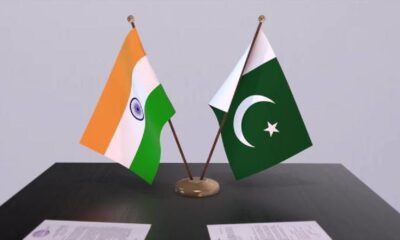
 Latest News5 days ago
Latest News5 days agoContact group on Afghanistan hits roadblock over Pakistan’s gripe with India
-

 Sport5 days ago
Sport5 days agoHetmyer powers Rajasthan win in low-scoring IPL thriller
-
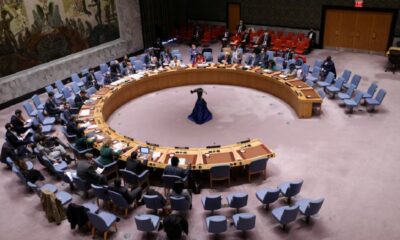
 World5 days ago
World5 days agoUN Security Council to meet Sunday on Iran attack
-

 World4 days ago
World4 days agoUS will not take part in any Israeli retaliatory action against Iran
-

 Latest News4 days ago
Latest News4 days agoOver 50 people dead in traffic accidents over Eid


